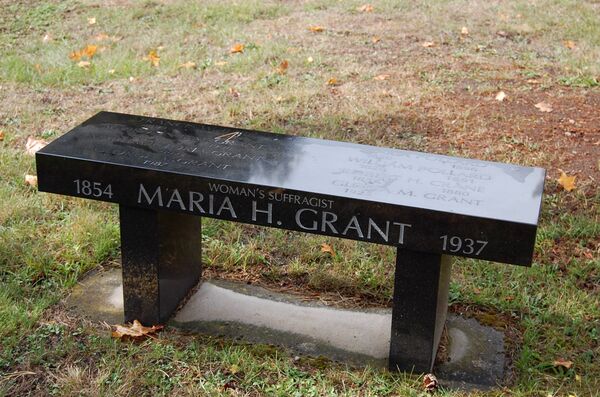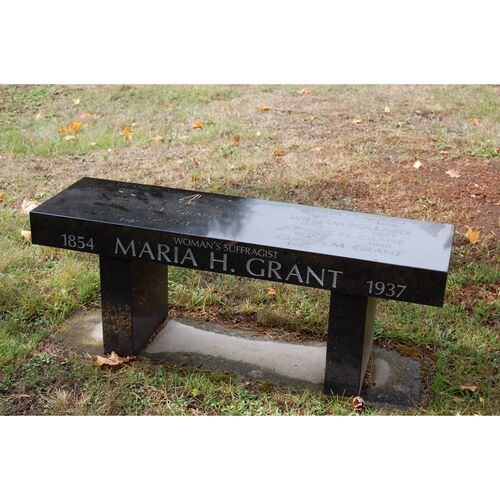
Source: Link
POLLARD, MARIA HEATHFIELD (baptized Maria) (Grant), social reformer, suffragist, school trustee, secretary, probation officer, and Unity movement preacher; b. 15 Sept. 1854 in Quebec City, daughter of the Reverend William Pollard and Maria Heathfield; m. 30 July 1874 Gordon Fraser (Frazar) Munro Grant (d. 5 Dec. 1908) in Victoria, B.C., and they had nine children, of whom two boys and five girls survived infancy; d. there 30 March 1937.
Maria Heathfield Pollard was born into a Methodist family. Her father had served as a minister in Upper and Lower Canada since his arrival from England in 1842, and during the 1860s he was chairman of several Methodist districts. In 1871 he accepted a call to Victoria and moved there with his wife, son, and four daughters, including Maria. In addition to caring for his city pastorate, Pollard became chairman of the Victoria district soon after his arrival and undertook missionary work along the coast. In 1873 Mrs Pollard was among those who established the British Columbia Protestant Orphans’ Home in Victoria.
In 1874 Maria married Gordon Grant, a marine engineer. Energetic and determined, she began her public career nine years later. The Pollards were strong advocates of temperance and Maria Grant and her mother were founding members of the Woman’s Christian Temperance Union of British Columbia [see Catharine Morton*]. Her mother was its first provincial president and Grant became provincial secretary in 1884. In March that year she made a public speech on the responsibilities of women voters. The WCTU promoted women’s suffrage; many women believed that if they could cast their ballot they would be able to influence legislation on alcohol. Years later Grant would recall that “when I was a small child and heard that women were not allowed to have any vote, I determined that when I grew up I should do my utmost to work for woman’s suffrage.” In 1885 she and other members of the WCTU circulated throughout the province the first petition for women’s enfranchisement and presented it to the Legislative Assembly. From then on, Grant and the WCTU would regularly call on the government to accede to their demands. The WCTU established a franchise department early in its existence; renamed the department of legislation, petition, and franchise in 1887, it would be superintended by Grant until 1915.
A key organizer in the formation of the Local Council of Women of Victoria and Vancouver Island in 1894, Grant was also a confident speaker, and she delivered the address that welcomed Lady Aberdeen [Marjoribanks], president of the National Council of Women of Canada, to the inaugural public meeting of the local council. Grant was named recording secretary of the new organization. In January 1895 the council successfully requested that the provincial government allow women to serve as school trustees. Grant, who had the necessary property qualifications, was chosen by the local council as its candidate. In March she easily defeated the only male contestant and was elected for a nine-month term, becoming the first female school trustee in British Columbia. She ran again the following year, but was not victorious, and attributed her loss to strenuous efforts to eliminate her and other women candidates. A man had stood all day at the entrance to the polling booth, urging voters to select a specific combination of male candidates or any contestants but the women. In 1899 she was again successful, but after her two-year term expired she lost her bid for re-election.
Throughout the 1890s and into the 20th century Grant was a force in the women’s franchise movement of British Columbia. In 1895 she published an article in the Victoria Daily Times entitled “The suffrage question; two views: fairly stated from both standpoints,” and persuaded the British Columbia Conference of the Methodist Church to support a WCTU petition to the federal government. She boasted of another petition, signed by 2,400 women, that was sent to the provincial government in 1897; she followed up on it by lobbying members of the assembly. As a result of her numerous letters to the editor of the Daily Colonist (Victoria), the paper referred to her as the “Woman’s Franchise Champion.” With a national plebiscite concerning Prohibition on the horizon [see Francis Stephens Spence*], temperance groups became more active. In 1897 Grant, once again secretary of the provincial WCTU, established a special plebiscite committee. That year she was elected secretary of the National Prohibition Federation of Temperance Societies of Canada and, while a delegate to the Dominion and World’s WCTU conventions in Toronto, she sent regular dispatches to the Daily Colonist.
In 1900 Grant became president of the provincial WCTU, a position she would hold for five years. That year she organized Willard Union, a new branch of the WCTU in Victoria, for the purpose of establishing and operating a men’s mission that would be an alternative to saloons and offer accommodation for destitute men. In 1889 the WCTU had set up the Refuge Home, initially destined to shelter prostitutes who wished to change their ways; it gradually became a home for unwed mothers. Grant had sat on the home’s board regularly since its inception, and in 1904 she co-supervised the construction of a new building for the home. After she stepped down as president of the provincial WCTU, she served as its treasurer from 1906 to 1912.
Grant’s activities were briefly curtailed by the illness and death of her husband in 1908. The following year, frustrated by British Columbia’s attempts to deprive women of their municipal voting privileges and the lack of action on the provincial franchise, she redoubled her efforts. Perhaps thinking that an organization with a single goal might be more effective than the WCTU, in late 1910 she formed and became first president of the Political Equality League of Victoria, devoted to pursuing women’s suffrage. It became the nucleus of a provincial PEL, formed in May 1911 with Grant at its head. With the league’s paid organizer, Dorothy Davis, she co-edited its monthly publication, the Champion (Victoria), from its beginning in August 1912. By the following year the PEL had expanded to 36 branches throughout the province. Grant led a delegation of 72 women to Premier Sir Richard McBride* to present a petition signed by 10,000 persons. Women were becoming increasingly impatient, not only with government, but with their own leaders. In June 1913, perhaps because the PEL’s members were anxious to transfer the presidency of the organization to the mainland, Grant was replaced by a Vancouver woman, but she continued to edit the association’s magazine until it ceased publication in April 1914.
After World War I broke out in 1914, suffrage activity declined. Grant and the Victoria PEL established the Women’s Industrial Centre to provide work for women as tailors. Grant also helped to create a day nursery for working mothers. Meanwhile, as women in British Columbia and elsewhere worked diligently on behalf of the war effort, their right to vote gained popular support. The provincial election of September 1916 included a plebiscite on women’s suffrage. When a large majority voted in favour of the measure, she simply declared, “It’s good just to have lived to see this day.” She led a delegation to the new premier, Harlan Carey Brewster*, to protest delays in implementation of the provincial franchise, which women finally obtained on 5 April 1917.
Grant continued to speak out on legislation she viewed as unfair, such as the federal War-time Elections Act of 1917, which allowed only women who were closely related to servicemen the right to vote. After the war, in 1918, she was chair of the Local Council of Women’s citizenship committee. The same year she announced the formation of the Women’s Independent Political Association to select and support female candidates in civic elections. As its delegate, she joined with other women to lobby the provincial government for mothers’ pensions. In addition, she was a member of the Victoria Reconstruction Group, which analysed post-war issues affecting women.
As a mother of seven surviving children, Grant had taken a keen interest in children’s welfare. In 1901 she had been involved in establishing the Children’s Aid Society of Victoria and had become its secretary. Necessity obliged her to obtain a salary, which was assigned to her post about 1910. The duties of probation officer were added a few years later. In 1917 the society held a public meeting to discuss its financial difficulties. Grant’s wages, considered excessive, were reduced; she resigned the following year.
Sometime during the 1920s or perhaps earlier, Grant was attracted to the teachings of the Unity movement, founded in the United States in the late 1880s by Charles Sherlock Fillmore and his wife, Myrtle. Grant became a teacher at the Unity Centre in Victoria and was occasionally referred to as Reverend Grant. Unfortunately, none of the movement’s ordination records from this period have survived. Grant retired because of illness in 1933 and died four years later at the Victoria Women’s Club. She had been a member and secretary of the club since its founding in 1913 and served as its hostess.
Endowed with missionary zeal, a pioneering spirit, and abundant optimism, Grant was a dynamic presence in British Columbia. As an officer of the WCTU, the Local Council of Women, and the PEL, she was a familiar figure in delegations to government, lobbying primarily for the franchise, but also on issues affecting women and children. At a meeting of the provincial WCTU in 1896 she had spoken on “Woman as a mother, reformer, and a citizen.” She was all three.
Maria Heathfield Pollard Grant wrote under her married name “The suffrage question; two views: fairly stated from both standpoints,” Victoria Daily Times, 27 May 1895, and “WCTU Mission Hall of Victoria,” Western Methodist Recorder (Victoria), 2 (1900–1), no.6.
BANQ-Q, CE301-S68, 30 nov. 1854. BCA, GR-2951, nos.1908-09-021698, 1937-09-528544; GR-2962, no.1874-09-001134; MS-2644. Daily Colonist, 1894–1933. Jim Nesbitt, “Old homes & families,” Daily Colonist, 11 Feb. 1951. Victoria Daily Times, 1895–1937. C. Bryant, “Rev. W. Pollard,” Western Methodist Recorder, 2, no.6. Champion (Victoria), 1 (1912)–2 (1914). C. L. Cleverdon, The woman suffrage movement in Canada, intro. Ramsay Cook (2nd ed., Toronto, 1974). G. H. Cornish, Cyclopædia of Methodism in Canada … (2v., Toronto and Halifax, 1881–1903). Elizabeth Forbes, Wild roses at their feet: pioneer women of Vancouver Island ([Victoria], 1971), 27–28. Lyn Gough, As wise as serpents: five women & an organization that changed British Columbia, 1883–1939 (Victoria, 1988). L. L. Hale, “The British Columbia woman suffrage movement, 1890–1917” (ma thesis, Univ. of B.C., Vancouver, 1977). Gloria Whelan, “Maria Grant, 1854–1937: the life and times of an early twentieth century Christian,” in In her own right: selected essays on women’s history in B.C., ed. Barbara Latham and Cathy Kess (Victoria, 1980). Woman’s Christian Temperance Union of B.C., Report of the annual convention (Victoria and Vancouver), 1907–9; later published as Yearbook and proc. of the annual convention (Vancouver), 1910–18 (copies held at BCA, Northwest coll.).
Cite This Article
Lyn Gough, “POLLARD, MARIA HEATHFIELD (baptized Maria) (Grant),” in Dictionary of Canadian Biography, vol. 16, University of Toronto/Université Laval, 2003–, accessed December 31, 2025, https://www.biographi.ca/en/bio/pollard_maria_heathfield_16E.html.
The citation above shows the format for footnotes and endnotes according to the Chicago manual of style (16th edition). Information to be used in other citation formats:
| Permalink: | https://www.biographi.ca/en/bio/pollard_maria_heathfield_16E.html |
| Author of Article: | Lyn Gough |
| Title of Article: | POLLARD, MARIA HEATHFIELD (baptized Maria) (Grant) |
| Publication Name: | Dictionary of Canadian Biography, vol. 16 |
| Publisher: | University of Toronto/Université Laval |
| Year of publication: | 2015 |
| Year of revision: | 2015 |
| Access Date: | December 31, 2025 |



